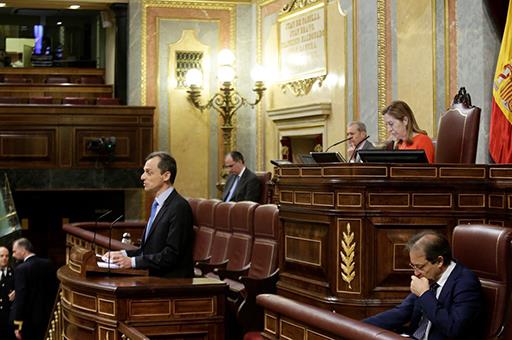Lower House of Parliament unanimously passes Royal Decree-Law on measures to improve scientific research
News - 2019.2.28
The new legislation will help to improve and increase the flexibility of research centres and universities. By passing this legislation, the Government of Spain is approving measures to reduce the administrative burdens preventing the development of scientific projects, make the flexible hiring of researchers easier and more stable, and increase resources to avoid delays in funding rounds, as well as other measures to increase equal opportunities among researchers and improve the situation of those affected by the Renta-Universidad loans for students.
The series of measures, which includes 10 legislative changes to regulations and various laws, seeks to enable researchers to focus on their work to generate and transfer knowledge. This should allow them to better compete at an international level and attract researcher talent.
Ex ante financial control at Public Research Bodies
Among the measures to reduce bureaucratic burdens and procedures, the Royal Decree-Law removes ex ante financial control at Public Research Bodies (Spanish acronym: OPI) and returns to the situation in 2014 (permanent financial control) in response to a demand from research staff to improve the operation of these bodies.
Flexible and stable hiring for research at universities and research centres
The Royal Decree-Law amends the 2011 Science Act so that centres and universities can hire staff indefinitely, using funds allocated to projects with specific financing. This measure, together with the increased stability for 1,454 temporary jobs at OPIs already approved on 25 January, will noticeably help to lower the temporary employment rate and instability among scientists, especially young scientists.
Another of the changes introduced by the Royal Decree-Law will allow Public Research Bodies to prepare standard annual reports for all scheduled hires, which will speed up the management of researcher recruitment for work.
Faster procurement of material and instruments for scientific projects
Research centres and universities will be able to perform lesser service and supply contracts up to 50,000 euros with the same supplier for various units even when said limits are exceeded on an annual basis with the sum total of all the contracts (e.g., the procurement of laboratory material for two projects at the same university).
State Research Agency
The new legislation will provide the State Research Agency with more external resources for reducing the periods needed to check research project grants. This will free up resources for the management of funding rounds.
Equal opportunities among researchers
The Royal Decree-Law also amends the 2011 Science Act so that researchers with maternity or paternity status, as well as those with temporary incapacity status, are not discriminated against in the selection and evaluation of their scientific activity. This measure was in high demand and will improve equal opportunities among researchers, especially scientists that are mothers, and will be applied to all funding rounds announced by the Ministry of Science, Innovation and Universities.
Renta-Universidad loans
The Royal Decree-Law contains substantial improvements for those affected by the Renta-Universidad loans given that recipients will only need to start repaying the loan once they start earning 22,000 euros/year, for which they will have a period of 15 years to repay. It is expected that this measure could benefit up to 12,000 young people who have yet to repay these loans, some of whom have incurred non-payment problems.
Agreement terms to suit scientific requirements
The Science Act is amended to extend the term of research agreements. In the case of agreements for Spanish or European centres, institutes and consortia, the term of these agreements is increased to 17 years.
The agreements for consortia will also be able to have longer terms if so required by the scientific project or the nature of the investments.
Other measures
Research centres, as well as consortia and foundations, will be able to make loan arrangements directly provided that they are financed by the European Regional Development Fund or the European Social Fund. This will avoid delay in the acquisition of equipment and in the completion of construction and infrastructure work for research centres. The repair and renewal of oceanographic research vessels or new equipment for large-scale scientific facilities would be examples of this sort of loan.
The last of the ten measures applies to Science and Technology Parks demonstrating themselves to be in a financial situation preventing them from meeting their repayment obligations for loans or down payments issued under the funding rounds managed by the Ministry of Science, Innovation and Universities. In these cases, and contingent upon the presentation of a feasibility plan, the debt repayments stemming from these funding rounds by the ministerial department will be deferred.
Non official translation





